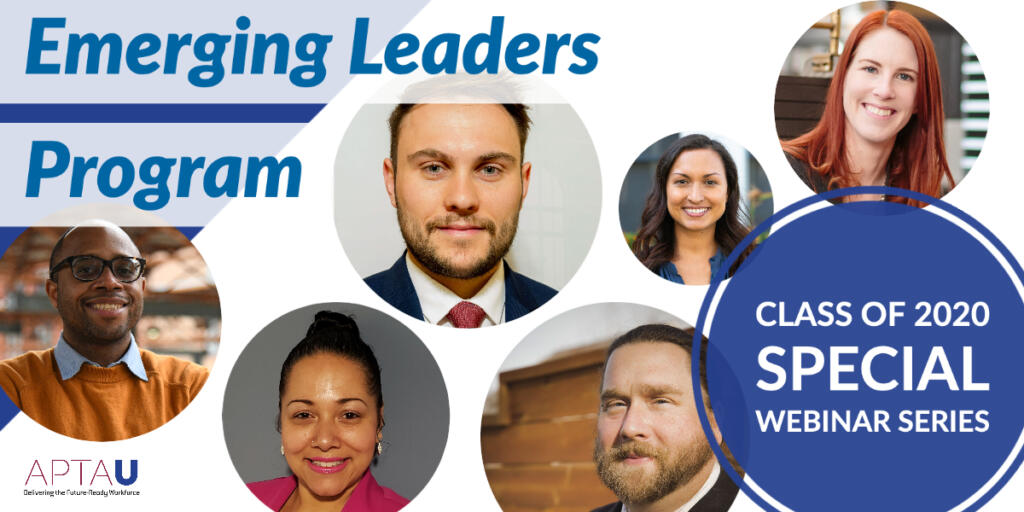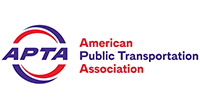
The members of the Emerging Leaders Program Class of 2020 have had a program experience unlike any of the classes that preceded them. Throughout their program year, the members of the class worked on projects that examine key issues facing the public transit industry. They collected data, interviewed industry leaders, and prepared presentations that explore some of the policies and practices within the industry. As the class prepared for their final capstone session, the world plunged into a pandemic that has reshaped how the transit industry interacts with our communities.
Though the pandemic has prevented the class from presenting their projects in person, we are offering them to the industry as a series of webinars. We hope you will join us for a special series where the members of the ELP Class of 2020 will present their findings and answer your questions on issues including workforce practices, fare incentive programs, and electric bus resiliency.
Customer Effort Score (CES)
Monday, August 31 | 3:00-3:45 p.m.
Customer-sourced feedback is most commonly framed within customer satisfaction scores (CSAT). While the indicators in these surveys can provide value, a customer’s satisfaction is an incomplete measure of how well they have been served. CSAT scores often drive attempts to go above and beyond, creating a risk of diverting focus away from the fundamental needs of the customer. Whether or not someone decides to purchase (or recommend) a product or service is often driven by how easy it is to access or use. Transit agencies do significant work to measure the quality of service. Most of this work centers on travel time, OTP, reliability, and proximity to “frequent” service (usually classified as headways under 15 minutes).
A 2010 Harvard Business Review article promoted a Customer Effort Score (CES), focusing on making things easy for customers. The background research indicated that low customer effort was a better predictor of customer loyalty and had a stronger relationship with behavior change over CSAT scores. CES methodology redirects focus from “exceeding expectations” to removing obstacles and unnecessary steps while focusing on the core services or products provided, often creating cost-saving efficiencies.
This presentation focused on the creation and distribution of a generalized survey to measure Customer Effort Score for transit. The presentation discussed an analysis of the results for key takeaways and items for action, and a template version of the survey was shared for other agencies to use and further develop.
Presenters:
- Steven Davis, Ben Franklin Transit
- Juan Higuera, Sound Transit
- Nick Nash, King County Metro
- Will Steep, BC Rapid Transit Company
- Madeline Steele, TriMet
Create a Customer Effort Score for your agency
Microtransit – Under the Microscope
Monday, September 14 | 3:00-3:45 p.m.
Microtransit is seen by the transportation industry as a new solution to improve rider experience and provide flexible routes with on-demand scheduling. Many transit agencies are implementing the new “silver bullet” of transit, but how successful really is microtransit for each of these agencies?
Our presentation outlines our analysis of a survey of agencies all over the U.S. who have implemented microtransit and explains where microtransit may be beneficial, and where it may not be. We also examine a case study of a microtransit pilot from CATA in State College, PA, and examine how their ridership and cost data may relate to other agencies with microtransit programs.
Presenters:
- Corentin Auguin, Metropolitan Atlanta Rapid Transit Authority
- George Maier, Connetics Transportation Group, Inc.
- Hannah Nelson, Kimley-Horn and Associates, Inc.
- Darron Stratton, Centre Area Transportation Authority
Mictrotransit Survey Responses (anonymized)
Electric Bus Resiliency
Thursday, September 17 | 3:00-3:45 p.m.
Transit agencies across the country are beginning to purchase battery electric buses to reduce emissions and create a better experience for their customers. When introducing your first electric buses, there are many challenges and considerations to take into account, including infrastructure improvements, charging management, and complex operations. However, many agencies do not realize that they need to develop thorough contingency plans for when the power goes out.
This presentation will explore the differences in resiliency planning for different vehicle fuel- types, including diesel, CNG, hydrogen fuel cell, and battery electric buses. The presentation will also summarize how reliable electricity grids are across the country and how this may change with more frequent climate change events. Based on the experiences of RTD (Denver) and RFTA (Aspen) and interviews with other transit agencies, this presentation will review the various resiliency strategies that are being planned and implemented for electric bus fleets. These resiliency solutions include strategic fleet mixes, backup generators, microgrids, and partnerships with utilities. Ideally, this presentation will be a helpful starting point for agencies to plan for a resilient zero-emission battery electric bus fleet.
Presenters:
- Carl Atencio, Denver Transit Operators
- John Blair, Roaring Fork Transportation Authority
- Carly Macias, Regional Transportation District
- Justin Henderson, Capital Metropolitan Transportation Authority
Generations in the Workplace – Combating Misperceptions and Embracing Differences
Monday, September 21 | 3:00-3:45 p.m.
The public transportation industry is facing a retirement crisis. As Baby Boomers retire, Gen Xers and Millennials move into management positions, and entry-level positions are filled by Millennials and Gen Z, transportation agencies are working to better understand the workplace elements that will be most successful in attracting and retaining competent and motivated employees. Our presentation will provide information to help your organization answer the following questions:
- How do individuals of varying generations differ from each other in the workplace, and how are they the same?
- How do I create a workplace that is inclusive for individuals of all generations?
- What strategies or initiatives should transit employers implement to prepare less-seasoned generations for management positions?
- What organizational or structural changes should transit employers consider to attract millennials and gen Z for entry-level positions?
Presenters:
- Colton Brown, Pennsylvania Department of Environmental Protection
- Raphael Causapin, HDR
- Alana Whipp, Quick Base
TNC Taxes and Incentives
Thursday, September 24 | 3:00-3:45 p.m.
Cities, transit agencies, and transportation network companies (TNCs) have a complicated relationship. Cities point to data that demonstrate the negative impact of TNCs on congestion, and transit advocates note that TNCs often draw much-needed ridership away from fixed-route service.
Some transit agencies—citing the high cost of expanded service, including paratransit—have found innovative ways to team up with TNCs. Still, several municipalities have implemented plans to tax TNC trips to support goals like promoting public transit use, making neighborhoods more pedestrian-friendly, and increasing equity through mobility.
Our group is taking a closer look at TNC partnerships with transit, and taxes on TNCs as a policy strategy that municipalities can adopt to address street congestion and incentivize public transit. We explore questions like:
- What are the objectives of these measures?
- Which jurisdictions have implemented them?
- How are these jurisdictions handling pushback (if any) from TNCs?
- Have these initiatives worked? What is key to them being successful?
- Does the public support them?
Presenters:
- Ella Cooper, WSP USA Solutions, Inc.
- Kenyon Corbett, Transportation Learning Center
- Bonnie Epstein, Pinellas Suncoast Transit Authority
- Levi McCollum, Lee County Transit
- Laura Moeini, Washington Metropolitan Area Transit Authority
Fare Incentive Programs
Monday, September 28 | 3:00-3:45 p.m.
Transit riders regularly identify fares as one of the most important deciding factors in whether they take transit. One way that agencies have tried to address the steady decline in transit ridership since 2014 is to institute innovative fare programs. While some programs aim to increase ridership through a lower (or even eliminated) fare, others connect transit to other shared modes. Through a survey of agencies and detailed case studies of free fares, fare capping, and mobile wallets, our presentation will analyze how agencies are using fare programs to address declining ridership.
Presenters:
- Matthew Broughton, Metro Transit
- Kelly Coughlin-Tran, Ecolane USA, Inc.
- Timothy Ruggles, Des Moines Area Regional Transit Authority
- Zachary Sunderland, Central Ohio Transit Authority
Challenges Women Face at the Executive Level
Thursday, October 1 | 3:00-3:45 p.m.
Women have made significant strides in the workplace but representation in leadership roles at the executive level is still a paramount issue for the transportation industry to address. What are the factors affecting the opportunities for women in the Executive Suite within the transportation industry? Surveys and interviews with female executives at transportation agencies and firms across the U.S. are conducted to dive into the experiences of those who have succeeded at the executive level. Results from this research are summarized to provide recommendations for all groups on how to strategically position women for the Executive Suite.
Presenters:
- Alma Basurto, San Francisco Bay Area Rapid Transit District
- Stephanie Burke, Los Angeles County Metropolitan Transportation Authority
- Lillian Lin, Foothill Transit
- Jacqueline Moon, Orange County Transportation Authority
Transit Stop, Collaborate, and Listen: Modernizing Transit Stops
Thursday, October 8 | 3:00-3:45 p.m.
Our presentation will cover everything a transit stop touches!
We’ll do a full assessment of what’s considered status quo of today’s transit stops—from a wide array of amenities to the challenges of providing those transit stop amenities. Then we’ll explore emerging trends in design that incorporate modern conveniences that integrate technology from real-time vehicle information to wayfinding. Building from there, we’ll explore what riders want today, but also what they expect from the transit stop of the future.
Presenters:
- Evan Alvarez, Champaign-Urbana Mass Transit District
- Christina Belmont, Genfare
- Trey Blaise, Metra
- Kira Thomas, Chicago Transit Authority




